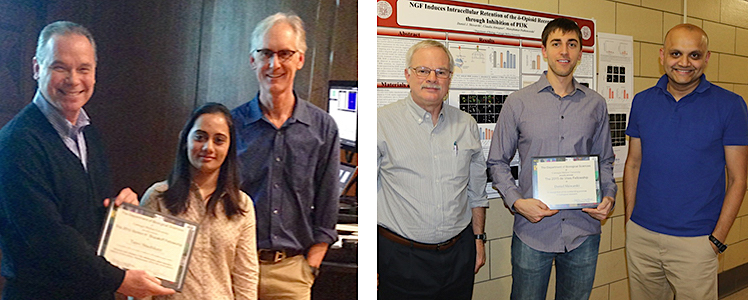Thursday, January 29, 2015

Winners Announced for 2015 Stupakoff and de Vries Fellowships
Congratulations to Tanvi Shashikant and Dan Shiwarski, winners of the Stupakoff and de Vries Fellowships! The fellowships are awarded to recognize outstanding research achievement and potential among Ph.D. students in Biological Sciences.
Tanvi Shashikant is a fourth-year Ph.D. student who works in the lab of Professor Charles Ettensohn. She is the recipient of the 2015 Stupakoff Fellowship in recognition of her contribution to the paper "Genome-wide analysis of the skeletogenic gene regulatory network of sea urchins." The paper was published in 2014 in the journal Development [volume 141:950-61], one of the most prestigious journals in developmental biology. Tanvi was co-first author of the paper with our recent Ph.D. program graduate Dr. Kiran Rafiq, and collaborated with Assistant Professor Joel McManus, an expert in genome-wide analysis. The paper focuses on a network deployed by primary mesenchyme cells of the sea urchin embryo, a well-defined embryonic cell lineage that exhibits a spectacular sequence of morphogenetic behaviors. Tanvi and Kiran’s studies expanded by an order of magnitude the number of downstream effector genes in the network and, through a series of transcription factor knockdown studies combined with whole-genome transcriptome profiling, identified regulatory inputs into a large fraction of these genes. We anticipate with enthusiasm the outcomes of Tanvi's current work to extend those pioneering studies to define and dissect specific transcription factor-DNA interactions in the network.
Dan Shiwarski is a third-year Ph.D. student who works under the guidance of Assistant Professor Manoj Puthenveedu. He is the recipient of the 2015 de Vries Fellowship in recognition of his outstanding promise in biological research. His rotation project in the Puthenveedu lab was to develop and optimize a luciferase-based cyclic-AMP sensor for spatially resolved imaging, a project that contributed to a manuscript that is currently accepted in Cell Reports. Dan's thesis project focuses on why newly synthesized delta opioid receptors are not efficiently delivered to the surface of neurons. The project addresses this question at a fundamental cell biological level, but it has the potential to lead to novel therapies for pain. Current therapies target the mu opioid receptor, and have limitations due to side effects including addiction. The delta opioid receptor is a promising alternate target for developing pain-relieving drugs without these adverse effects. Understanding how these receptors are delivered to the neuronal surface will uncover mechanisms that can be manipulated to increase the bioavailability of the receptor in our body and increase drug efficacy. The project fits well with Dan's long-term research interests in how neuronal responses are tuned by concerted signals in the brain. We look forward with confidence to Dan's continued success and exceptional productivity.
We are grateful to the donors whose contributions made these awards possible, the late Semon Stupakoff (E’20) and Glen deVries (MCS'94). Semon Stupakoff studied metallurgy at Carnegie Tech and received the alumni achievement award from Carnegie Mellon in 1979. Mr. Stupakoff made vast contributions to the production and development of improved ceramics and in the expansion of ceramics technology. The Stupakoff Ceramic and Manufacturing Company became a world leader in the production of highly technical ceramics. After his retirement, Mr. Stupakoff created a new company, the Latronics Corporation, which became a leader in production of ceramic to metal and glass to metal seals used in electronics.
Glen deVries received his B.S. in molecular biology and genetics from Carnegie Mellon in 1994, then worked as a research scientist at Columbia Presbyterian Medical Center. He combined his skills in biology and biomedical research together with computer savvy to become the president and co-founder of Medidata, and the original architect of the Medidata Rave platform. Glen has been driving Medidata’s vision since its inception: delivering cloud-based solutions to transform the life science industry's approach to bringing new treatments to market.
Photo credits:
[left image] Tanvi Shashikant (center), Aaron Mitchell (Stupakoff Committee Chair, left), and Chuck Ettensohn (Dissertation Advisor, right).
[right image] Dan Shiwarski (center), John Woolford (Department Head, left), and Manoj Puthenveedu (Dissertation Advisor, right).